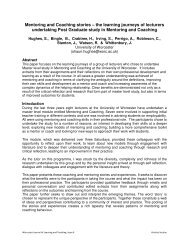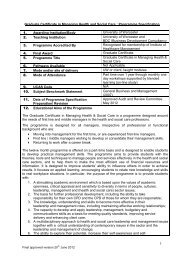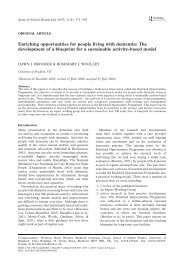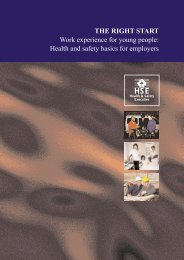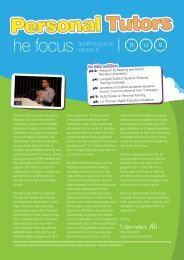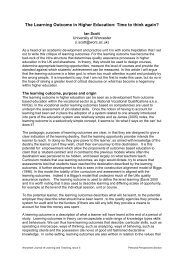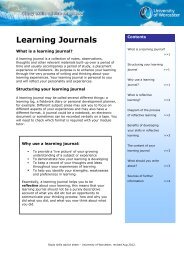Discovery, Dream, Design and Destiny
Discovery, Dream, Design and Destiny
Discovery, Dream, Design and Destiny
You also want an ePaper? Increase the reach of your titles
YUMPU automatically turns print PDFs into web optimized ePapers that Google loves.
Introducing Appreciative Inquiry:<strong>Discovery</strong>, <strong>Dream</strong>, <strong>Design</strong> <strong>and</strong><strong>Destiny</strong>Dr John Peters, NTF, FHEAAcademic Development <strong>and</strong> Practice UnitJanuary 2013
Plan• Brief overview of the Day• The concept <strong>and</strong> four stage process ofAppreciative Inquiry– <strong>Discovery</strong>, <strong>Dream</strong>, <strong>Design</strong> & <strong>Destiny</strong>• Student presentation of their researchfindings• Work through the stages of AppreciativeInquiry
The AI project processBriefing• Discussion with project team of realising potential<strong>and</strong> presenting achievement• Introduction of team to Appreciative Inquiry<strong>Discovery</strong> & Debrief• Data collection: adjectives & collecting stories• Data analysis: propositional statementsPresentation &staff development• Develop presentation• Presentation of student findings to conference• Facilitation of dream, design & destiny – today!
Appreciative Inquiry• Ap-pre’ci-ate, v., 1. valuing; the act of recognizing thebest in people or the world around us; affirming past<strong>and</strong> present strengths, successes, <strong>and</strong> potentials; toperceive those things that give life (health, vitality,excellence) to living systems 2. to increase in value,e.g. the economy has appreciated in value. Synonyms:valuing, prizing, esteeming, <strong>and</strong> honouring.• In-quire’ (kwir), v., 1. the act of exploration <strong>and</strong>discovery. 2. To ask questions; to be open to seeingnew potentials <strong>and</strong> possibilities. Synonyms:discovery, search, <strong>and</strong> systematicexploration, study.
Appreciative Inquiry• Based on David Cooperider’s doctoral work at CaseWestern Reserve University (1999)• Eschews former Organization Development (OD) deficitmodels• Espouses a positive approach to change that builds avision for the future based upon what already works wellwithin an existing system• Self-empowering philosophy• ‘4-D’ process (Discover, <strong>Dream</strong>, <strong>Design</strong> <strong>and</strong> <strong>Destiny</strong>)• Focus on collaborative working of all stakeholders• Engages all stakeholders in systematic participation in ajointly constructed vision of anorganization’s future
The Key Question in AI• The ‘unconditional positive question’• The systematic discovery of what gives “life”to a living system when it is most alive, mosteffective, <strong>and</strong> most constructively capable ineconomic, ecological, <strong>and</strong> human terms.• What gives life here?• What is it about our University that helpsstudents realise their potential <strong>and</strong> presenttheir achievement?
The AI process<strong>Discovery</strong>Sharing the positives ‘What gives life here?’‘How are we currentlyhelping studentsachieve theirpotential?’<strong>Dream</strong>Sharing a vision‘What would ourperfect life-givingorganisation looklike?’‘How would we look ifwe were doing thesethings all the time?’<strong>Design</strong>Sharing what we thinkshould be‘What will be ourguiding principles?’‘How could we helpstudents achieve theirpotential all the time?’<strong>Destiny</strong>Sharing acommitment tochange‘What are our firststeps towards thisfuture?’‘What can I do now tohelp us move forwardon achieving potential<strong>and</strong> presentingachievement?’
<strong>Discovery</strong> Phase: over to the students topresent what they have done <strong>and</strong> found
<strong>Dream</strong> Phase• Do you recognise your University?• Do you have similar stories?• What’s your response?• What are your aspirations?• What should be the ideal for helpingstudents realise potential <strong>and</strong> presenttheir achievement?• Picturing a future: drawing a vision
<strong>Dream</strong> phase activity• In groupsproduce aposter of yourvision of theperfect, lifegivingUniversity forhelpingstudents realisetheir potential
<strong>Design</strong> Phase• Co-constructing• What might we be?• Possibility propositions<strong>and</strong> new organising principles• What would this organisation be like if itwere designed to maximise the positivecore <strong>and</strong> accelerate the achievement ofour dream?
<strong>Design</strong> Phase activity• In groups consider:• What would the driving ethos be of ourenvisioned University if it was constantlyfocused on helping students realise theirpotential <strong>and</strong> present theirachievements?• What would the values <strong>and</strong> organisingprinciples of this imagined University be?
<strong>Destiny</strong> Phase• Not the action plan!• ‘Positive protest’• Realising the dream• An appreciative organisation• ‘An inspired movement not a packagedproduct’
References• Chapman, V. (2010) ‘Appreciative Inquiry as evaluation: enhancing <strong>and</strong> developingacademic practice’ in Sunders, M. Trowler, P. & Bamber, V. ReconceptualisingEvaluative Practices in Higher Education, Open University Press• Cooperrider, D. & Whitney, D. (2005) Appreciative Inquiry: a positive revolution inchange, San Francisco.• Cousin, G. (2009) ‘Appreciative Inquiry’ in Researching learning in HE, Routledge.• Kadi-Hanifi, K., Dagman, O., Peters, J., Snell, E., Tutton, C. <strong>and</strong> Wilson, T.,‘Engaging students <strong>and</strong> staff with educational development through AppreciativeInquiry’ Innovations in Education <strong>and</strong> Teaching International, Forthcoming.• Ludema, J. Cooperrider, D & Barrett, F. (2001) ‘Appreciative Inquiry: the power of theunconditional positive’ in Reason, P. & Bradbury, H. H<strong>and</strong>book of Action Research• Seale, J. (2010) ‘Doing student voice work in higher education: an exploration ofthe value of participatory methods’, British Educational Research Journal, 36:6,995-1015• Symonds, E. (2010) ‘Evaluating an e-Portfolio implementation with early adoptersusing Appreciative Inquiry’ Journal of Learning Development in HigherEducation, Special Edition: Researching <strong>and</strong> Evaluating PDP<strong>and</strong> e-Portfolio Practice• The AI commons http://ai.cwru.edu



